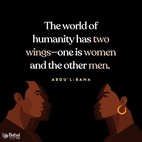The views expressed in our content reflect individual perspectives and do not represent the authoritative views of the Baha'i Faith.
“War is the locomotive of history,” argued Leon Trotsky, one of the architects of the Bolshevik Revolution that overthrew the czarist monarchy in Russia, establishing the world’s first communist government in 1917.
Sadly, a fair amount of evidence supports Trotsky’s depressing claim. Even the humble zipper, used to fasten clothing parts together, grew out a need to make more efficient, easier-to-wear uniforms for World War I soldiers.
Major war-driven advancements have included:
- Computers, first pioneered in Great Britain during World War II to break German military codes.
- Penicillin, the first mass-produced antibiotic, created as a way to prevent disease caused by wounds from killing soldiers during World War II.
- Radar, a motion detection system that uses radio waves to calculate the location and speed of objects – especially airplanes – was invented as a means of tracking incoming German bomber formations during that war.
RELATED: Ambassador to Humanity – Episode Six: The Road to World Peace

Once upon a time, war seemed more manageable. Frederick the Great, the Emperor of Prussia from 1740 to 1786, could rightly boast that, when he led his troops into battle, the merchants and tradesmen of his country “should neither know nor care.”
The problem of war is that, over time, it has become more effective and efficient at killing larger and larger numbers of people, as the Baha’i teachings point out:
The greatest catastrophe in the world of humanity today is war. … Implements of war and death are multiplied and increased to an inconceivable degree, and the burden of military maintenance is taxing the various countries beyond the point of endurance. Armies and navies devour the substance and possessions of the people; the toiling poor, the innocent and helpless are forced by taxation to provide munitions and armament for governments bent upon conquest of territory and defense against powerful rival nations. There is no greater or more woeful ordeal in the world of humanity today than impending war. Therefore, international peace is a crucial necessity.
Those words from Abdu’l-Baha, from a speech he gave in Montreal, Canada in 1912, preceded the First World War by two years. Roughly 40 million soldiers and civilians died during World War I, from 1914 to 1918.
By the end of World War II in 1945, that number has escalated to as many as 85 million people – about 3% of the world’s population in 1940.
Experts estimate that a full-scale nuclear war would exterminate roughly 1 billion residents of this planet, approximately 13.5% of the entire global population.
So now, it should be obvious that we need to put an end to war before war puts an end to us. But, how can we do it?
Some impressive if futile efforts have been made. After the massive and shocking bloodshed caused during World War I, the nations of Europe held a peace conference which resulted in the formation of the League of Nations. This international body – created to prevent war and promote peace through a series of interlocking treaties and agreements between its member nations – held out hope for peace.
But, its aims were thwarted by the rise of fascism in Europe during the 1920s and 30s and because its democratic member nations refused to jeopardize their trade relations by enforcing economic sanctions against fascist Italy and later Nazi Germany.

The League effectively collapsed after Italy, Germany, and Japan withdrew from membership and Germany invaded Poland in 1939.
Then, after the carnage of World War II, another attempt was made to create and enforce global peace, the United Nations Organization. This body has enjoyed a much longer and more effective history, and some of its agencies, such as the World Bank, the Food and Agricultural Organization and the United Nations Education, Scientific, and Cultural Organization (UNESCO), have performed lasting and important work.
But the UN hasn’t been able to stop the proliferation of nuclear weapons, and has had only limited and temporary success negotiating agreements to prevent the spread of war.
Which brings us to the heart of the problem – peace cannot be achieved through solemn treaties or formal pacts. These have been repeatedly tried and broken. They work only as long as it remains in the interest of all parties to adhere to the terms.
Throughout history, many nations have been willing – even eager – to scrap painfully worked out agreements if they believed they could gain political advantage by waging war.
So if hammering out solemn formal agreements doesn’t work, then we need to re-examine the rationale behind that process. That reasoning in the past – that peace is necessary because it is in the best welfare and public policy interest of the countries of the world – has sufficed except when it didn’t. The result: war.
The fundamental mistake, to regard peace as a condition driven by political, economic, or social factors, must be rectified. While there is some truth to support that reasoning, the establishment of a just and lasting peace depends on much more than positive diplomatic, financial, and public interest circumstances.
What has been missing from the desire to establish peace has been any overriding spiritual impulse or religious emphasis on human harmony.
Unlike any other social force in the world, religion has a mysterious power that we don’t understand – and perhaps cannot understand – to influence human behavior in positive ways, and persuade its adherents to act selflessly for the betterment of humankind.
The Baha’i Faith’s contribution to this process centers on its fundamental recognition and acceptance of the unity of humanity, so that no group of people, whether racial, ethnic, religious, or national, can be regarded as superior to any other group of people.
RELATED: How Does the Baha’i Faith Propose to Unify the World?
Additionally, the Baha’i teachings focus on a pressing need to end the rampant and growing economic inequality in the world. Economic disparity promotes instability and sparks volatility, both major causes for war.
Finally, the Baha’i Faith rejects nationalism, that outmoded, wrong-headed, and crippling doctrine that perpetuates the myth that one’s native country is superior to all others. Nationalism, Baha’is know, simply has no place in today’s world, with interconnections between nations and regions steadily growing stronger.
As important and vital as it is to firmly and permanently implant these new doctrines in humanity’s collective consciousness, the only way to do that is to have them accepted and embraced on a person-by-person basis by the vast majority of the residents of this planet.
Early in the 20th century, Abdu’l-Baha cautioned that:
… peace must first be established among individuals, until it leadeth in the end to peace among nations. Wherefore, O ye Baha’is, strive ye with all your might to create, through the power of the Word of God, genuine love, spiritual communion and durable bonds among individuals. This is your task.
As to the matter of war inspiring human inventiveness, well, we shall have to find another way to express our creativity. The fact that we won’t have to resort to war anymore will go a long way to achieving that goal.

















Comments
Sign in or create an account
Continue with Googleor